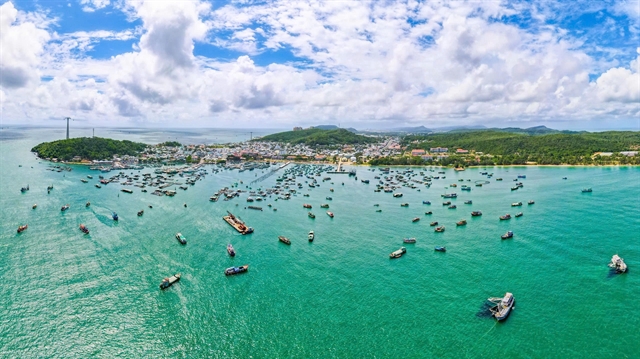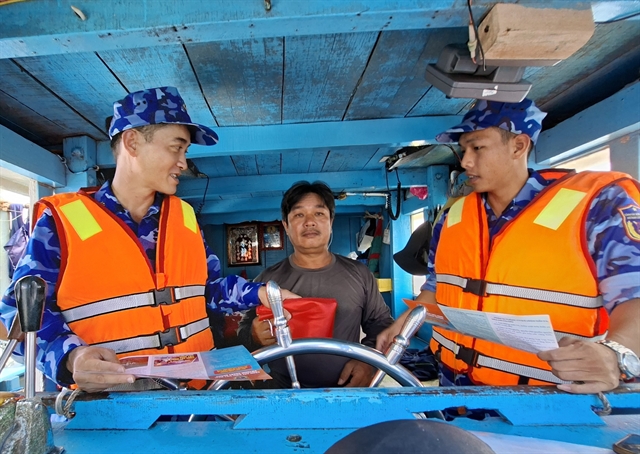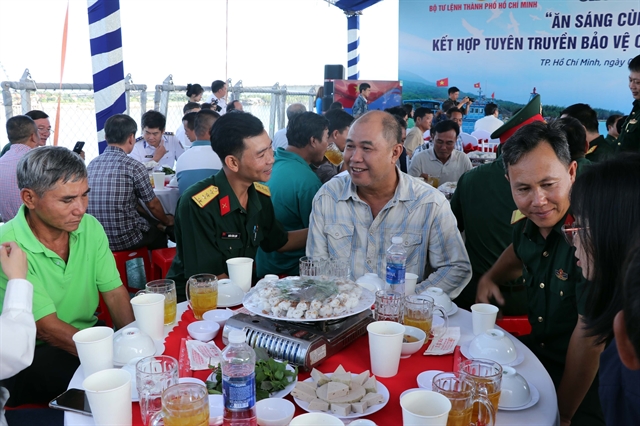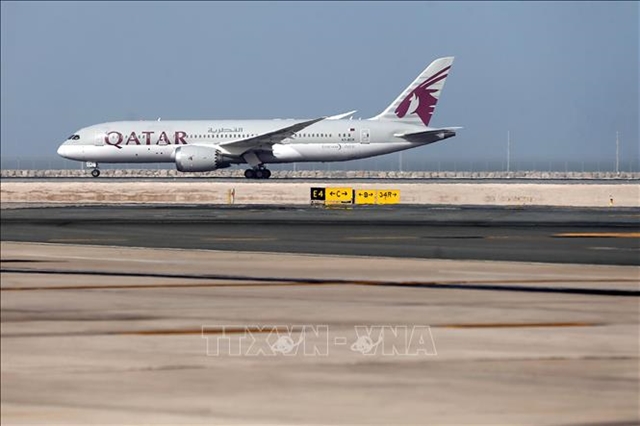 Society
Society

 |
| Fishing boats near the docking area in the southern province of An Giang. — VNA/VNS Photo Văn Sĩ |
HCM CITY — Fishermen and the armed forces are working side by side to safeguard Việt Nam’s waters, forming a unified presence that links economic development with the protection of national sovereignty. Standing with them at sea are the People’s Navy, Coast Guard and Border Guard, who help ensure that traditional livelihoods remain closely connected to national defence.
With more than 3,260km of coastline, Việt Nam holds a favourable position as a gateway for international trade and maritime transport. Twenty-one out of its 34 cities and provinces border the sea and more than half of the population live in coastal areas, making fishermen vital to national security and defence at sea.
Amid the vast ocean, each fishing vessel serves as a ‘living marker’ affirming the nation’s maritime and island sovereignty.
Maritime strategy
After a decade of implementing Việt Nam’s Maritime Strategy to 2020, awareness across the political system, among citizens and overseas Vietnamese, of the role of the sea and islands in economic growth and sovereignty improved significantly, according to the 12th-tenure Party Central Committee’s Resolution No 36-NQ/TW, issued on October 22, 2018.
National sovereignty and security at sea have been firmly maintained while maritime safety and search-and-rescue work has been ensured and international cooperation on maritime issues proactively and comprehensively promoted.
However, many limitations and weaknesses remain and sustainable marine economic development continues to face difficulties and challenges. Maritime economic growth has yet to be harmoniously linked with social development and environmental protection.
Resolution 36 identifies subjective causes as the main reason behind these shortcomings.
The East Sea (internationally known as the South China Sea), particularly its southern waters, has been identified as resource-rich. This area also hosts some of the country’s most dynamic economic activities, including offshore oil and gas rigs and pipelines, world-class seaports with heavy vessel traffic, the DK1 platform cluster providing economic, scientific and technical services, as well as international undersea fibre-optic cables and emerging offshore wind-power developments.
It is also a long-established traditional fishing ground attracting vessels from central and south-central regions. Over the years, these activities have contributed greatly to national development, underlining the strategic importance of this maritime zone.
In this context, Resolution 36 sets out a breakthrough policy to improve living standards and ensure security and safety for coastal, island and marine workers. It also seeks to develop cultural institutions for maritime communities and promote national identity, history and maritime cultural values as the basis for building a distinctive maritime culture in Việt Nam.
The resolution calls for consolidating all-people national defence and security at sea, enhancing the ability to effectively handle maritime situations and resolutely safeguarding independence, sovereignty, sovereign rights, jurisdiction and national interests over Việt Nam’s maritime zones.
These measures reaffirm the country’s consistent policy of maintaining a peaceful, stable environment and respecting international law at sea.
All-people defence
Việt Nam’s southern maritime region is protected by a combination of armed forces, including Navy Region 2, Coast Guard Region 3, the Border Guard, naval and border-guard flotillas and key defence zones located at the maritime gateways of HCM City.
On May 30, 2019, Navy Region 2 was chosen by the Việt Nam People’s Navy as the first unit to coordinate with the Department of Agriculture and Rural Development of Bà Rịa–Vũng Tàu Province (now part of HCM City) to launch the programme 'Việt Nam People’s Navy – A steadfast support for fishermen at sea.'
The programme aims to strengthen communication, advocacy assistance and protection for fishermen engaged in safe and lawful fishing, building all-people national defence at sea and contributing together with the Navy to safeguarding maritime and island sovereignty in the new era.
Similar programmes have been launched with the coast guard and border guard forces to help stabilise fishermen’s livelihoods and provide support to fishing vessels at sea.
 |
| Coast guards communicate with a fisherman about regulations against illegal, unreported and unregulated (IUU) fishing. — VNA/VNS Photo Hoàng Nhị |
Through various creative and practical approaches, these programmes have garnered wide social engagement, strong political and social significance and tangible results, earning an enthusiastic response and participation from local Party Committees, authorities and coastal communities, fisheries organisations, vessel owners and fishermen alike.
As a result, the quality and effectiveness of support and protection for fishermen conducting safe, lawful fishing have steadily improved, with their political awareness and sense of responsibility strengthened.
According to Navy Region 2, thanks to the strong bond between the military and the people at sea, from 2019 to mid-2025, fishermen operating in the waters under the region’s management had detected and promptly reported nearly 450 ships, mostly foreign military or law-enforcement vessels. This has helped naval forces effectively track, monitor and handle situations, ensuring safety for both maritime economic and defence activities.
Deputy Political Commissar of Navy Region 2 Colonel Đỗ Hồng Duyên noted that in addition to the core professional role of the armed forces in protecting maritime sovereignty, the presence of fishermen at sea is not only vital for economic development but also constitutes an early and distant defensive line for safeguarding the nation’s maritime domain.
Heartfelt efforts
Along with strong investment from the State in infrastructure for fisheries logistics centres such as ports, storm shelters and credit support policies for fishermen, recent years have seen an increase in meaningful activities carried out by the armed forces, local Party committees and coastal authorities.
These practical, heartfelt efforts have become a firm source of support, helping fishermen feel secure as they head out to sea.
From the beginning of 2025 until now, the HCM City Border Guard Command has organised free medical check-ups and medicine distribution for 1,300 people and presented nearly 5,400 gift packages, 936 scholarships, as well as numerous production funds and tools to disadvantaged households, fishermen and students.
In addition to educational and livelihood charity programmes, the border guards also mobilised funding to build and repair 18 temporary and dilapidated houses in their managed areas, worth over VNĐ1 billion (US$38,000) in total.
Navy officers and coast guards also carried out similar initiatives, distributing life jackets, torches, first-aid kits and national flags to fishermen.
Nguyễn Văn Tôn, a fishing boat owner from HCM City’s Phước Thắng Ward, said the “Breakfast with Fishermen” programme running for the past five years has provided a valuable space for fishermen to share their thoughts and aspirations with officers.
Authorities in the city’s Phước Hiệp Hamlet also regularly hold morning coffee sessions with local fishermen, said the hamlet’s Party Organisation Secretary Nguyễn Văn Nhỏ. This is the occasion for officers to inform and communicate with fishermen about current regulations and combating illegal, unreported and unregulated (IUU) fishing.
 |
| Fishermen and law enforcers at a “Breakfast with Fishermen” event held in Phước Thắng Ward, HCM City in early October 2025. — VNA/VNS Photo Đoàn Mạnh Thắng |
As a result, fishermen’s awareness has greatly improved. They now strictly comply with regulations, maintain their vessel monitoring devices throughout operations at sea, avoid encroaching on foreign waters, and ensure that their fishing activities follow the law.
Navy Region 2’s Deputy Political Commissar Colonel Duyên said that the number of Vietnamese fishing vessels entering foreign waters has dropped significantly and is on track for complete elimination.
In addition to supporting residents in coastal areas, Navy Region 2 consistently maintains forces and ships on patrol duty in assigned waters, especially in preventing IUU fishing in overlapping areas between Việt Nam and Indonesia, and Việt Nam and Malaysia.
Since 2019, the region’s vessels have successfully negotiated and rescued 12 Vietnamese fishing boats seized abroad, returning them safely to Vietnamese waters and handing them over to competent authorities. The unit has also participated in 248 rescue missions.
Meanwhile, Platform DK1 recorded over 2,000 fishing trips, rescued 58 fishermen in distress and provided medical treatment and medicine for over 300 fishermen suffering illnesses at sea.
Since early 2025, Coast Guard Region 3 has carried out over 250 long-term patrols and inspections, during which crews have provided timely aid to numerous fishermen injured in marine accidents.
Deputy Director of the HCM City Department of Agriculture and Environment Phạm Thị Na noted that labour conditions at sea are harsh and the regular presence of Coast Guard and Navy vessels in recent years has greatly reassured fishermen in their offshore operations.
As one of the country’s largest fisheries centres with over 4,700 fishing vessels, HCM City’s Border Guard has actively coordinated to maintain thousands of ‘self-managed safe boat teams’ and ‘self-managed security teams’ with local fishermen.
Border guards were also assigned to coastal households to ensure close contact and timely grasp of fishermen’s situations and concerns.
Thanks to regular interaction and the dedicated support of the armed forces, local Party Committees and authorities, more fishermen now better understand the Party’s guidelines and the State’s laws on sustainable marine economic development.
They comply with regulations, avoid violations of foreign waters and actively cooperate with functional forces while working offshore, protecting both their livelihoods and the nation’s maritime sovereignty. — VNS




